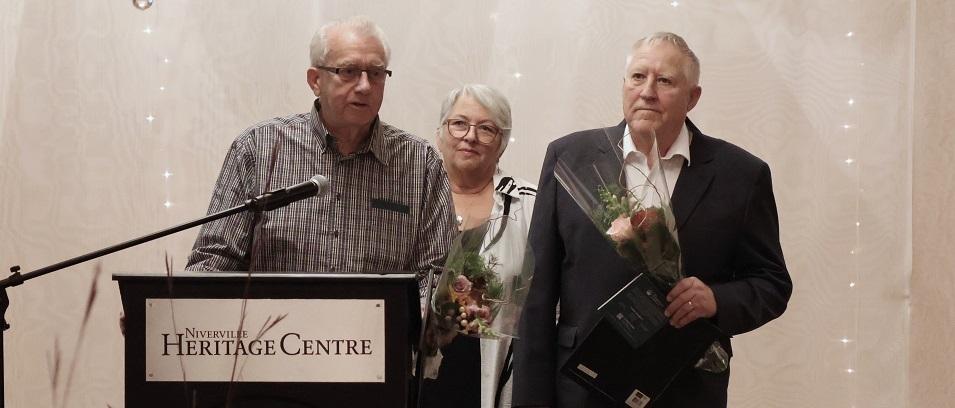The Niverville Foundation’s inaugural wine and cheese event was held on October 20 at the Heritage Centre. Invited guests included community and foundation supporters of all stripes and demographics, there to hear about some big changes recently undertaken this year.
The event was also held in celebration of the many years of dedicated service provided by two retiring foundation directors, George Sawatzky and Aaron Redekop.
These two longtime Niverville residents and community champions were honoured with a plaque and a tree that will be planted in Hespeler Park on their behalf.
The goal of the Niverville Foundation’s directors in recent years has been to bring the non-profit organization some new vitality after 31 years of operation.
Formerly known as the Niverville Health and Community Foundation, the name has since been trimmed to match its more all-encompassing purpose. Three new board members have also been added to replace the retiring two, bringing with them a fresh focus.
The board has also hired international graphic and web design company Chez Koop to rebrand the foundation’s look.
“We didn’t have a website,” says board member Annette Fast. “We had a logo, but it was very outdated. It was a circular elevator, which has been overused.”
Since then, an attractive and user-friendly website has been developed along with an improved logo depicting a tree and its roots. The logo has been designed to go alongside the foundation’s new catchphrase: “rooted in community.”
The board’s hope is that the foundation will be seen as a program that invests in people, and not just the place.
Finally, the Niverville Foundation has partnered with experts in the field of philanthropic investment, Cardinal Capital Management Inc. Its vice president, Dewayne Osborn, has delivered sound and strategic investment advice, helping to strengthen the foundation.
History of the Niverville Foundation
The Niverville Health and Community Foundation was born in 1992 when Norman Wittick approached George Sawatzky with a request. Wittick dreamed of Niverville someday providing amenities that allowed seniors to live out their final years in the community. At that stage, Wittick had already been forced to move away.
Sawatzky, then manager of the Niverville Credit Union, set to work to form an incorporated non-profit foundation whose goal would be to receipt donations which could be used to better the community.
Wittick provided the initial seed money to get the foundation off the ground.
“The foundation was started with a grant from Norman Wittick for $25,000,” Sawatzky said. “And later, in his will, he allocated another $75,000. That $100,000 has risen to approximately $1.3 million. Where did that come from? That came from you.”
Sawatzky formed the board of directors, which included an assembly of other like-minded community champions: Abe Goertzen, Alex Fast Sr., Jack Stott, Ben W. Hiebert, and Fred Kaita.
Today, the past and present foundation members can be proud to say they’ve accomplished Wittick’s dream. The foundation has had a hand in the construction of the Silver Courts seniors living complex, the Niverville Credit Union Manor, and the Heritage Life Personal Care Home.
Niverville now enjoys a full circle of aging-in-place amenities and services. In fact, the town has become a model for other communities around the province.
But it’s not just seniors projects that have benefited from the Niverville Foundation over the years. The foundation has funded scholarships and supplied countless dollars in training and equipment for the town’s emergency medical services and firefighters team.
Fast, a six-year board member, says they’ve been approached by individual requests for help over the years as well. These usually include requests for financial support for medications and other basic life needs.
“We had a request last year from a doctor in town saying that his clients were of low income and they needed an outlet to go and get physically active,” Fast says. “He said, ‘Can you fund five passes to a swimming pool?’ So we did that.”
The board addresses each request as it comes in to determine whether, and to what degree, they will get behind it.
Donating to the Foundation
According to Fast, the foundation doesn’t just rely on people doing estate-planning. Someone selling capital, for instance, may be interested in donating the proceeds. Others may look to ease their tax burden by making a charitable donation.
By investing these dollars in the Niverville Foundation, donors can receive an instant tax receipt for the entire amount upfront. The donation can then be doled out to projects or organizations as the donor sees fit, over an indefinite period of time. Or they can leave the disbursement decisions entirely up to the board.
Another benefit, according to Osborn, is that individuals or families can create their own personal foundation within the Niverville Foundation without having to jump through any of the legal hoops to do so. They can name their personal foundation and receive recognition for their donations, or choose to remain anonymous as donations are made on their behalf.
In the end, the Niverville Foundation provides all of the administrative work and reporting to the Canada Revenue Agency so the donor doesn’t have to.
“[Our directors] see to a foundation that makes sure that Niverville is a place of growth,” Fast says. “A place where people feel welcome. A place where people are rooted.”


